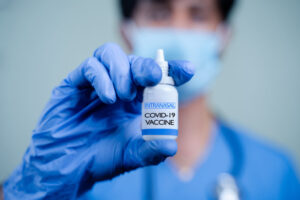A team of researchers at the University of Maryland has developed a groundbreaking nasal spray vaccine that has demonstrated effectiveness in reducing the spread of COVID-19. The technology, described in a research paper published in Nature Communications on November 6, 2023, could potentially be adapted to confer immunity against other respiratory viruses, such as influenza and respiratory syncytial virus (RSV).

The nasal vaccine offers a significant advancement over traditional intramuscular shots. By delivering the SARS-CoV-2 spike protein directly into the cells of the airway in mice and hamsters, the vaccine triggers a potent immune response. This response not only significantly reduces infection rates but also impedes the replication of viral particles in the airway before they can enter the bloodstream.
Professor Xiaoping Zhu, the lead author of the study and a veterinary medicine expert at UMD, highlights the importance of a vaccine that is easy to administer and can prevent transmission. “This nasal vaccine prevents virus transmission and can be easily adapted for new variants,” says Zhu.
Unlike intramuscular vaccines that primarily create immunity in the bloodstream, the new nasal vaccine induces immunity in the cells lining the nose, mouth, and throat. By doing so, it prevents the virus from progressing further into the body.
The researchers harnessed the body’s natural transport mechanism using a protein called neonatal Fc receptor (FcRn) to carry antibodies across epithelial cells. By attaching the SARS-CoV-2 spike protein to FcRn and delivering it via nasal spray, the team observed a more potent immune response in the airway and lungs compared to traditional injections.
Testing the vaccine against various COVID-19 variants, including Delta and Omicron, revealed promising results. While unvaccinated mice exposed to the Delta variant experienced high mortality rates, most vaccinated mice survived. Additionally, mice exposed to major Omicron variants showed reduced inflammation and virus loads compared to their unvaccinated counterparts.
Furthermore, the nasal vaccine demonstrated a significant reduction in airborne transmission, a crucial factor given the potential for virus particles to linger in the air for extended periods.
As COVID-19 cases and hospitalizations rise due to new variants, the nasal vaccine offers a promising solution. Aligned with the U.S. government’s Project NextGen initiative, which aims to develop an effective nasal vaccine, Professor Zhu’s team believes their creation meets the criteria of controlling the spread of variants.
The collaborative effort, involving researchers from UMD, USDA ARS, and Virginia Tech, received support from organizations like the National Institutes of Health NIAID, the University of Maryland Agriculture Experiment Station, and the USDA ARS intramural research program.
In conclusion, the nasal spray vaccine presents a notable advancement in the fight against COVID-19, providing hope for improved vaccination rates and reduced disease transmission.